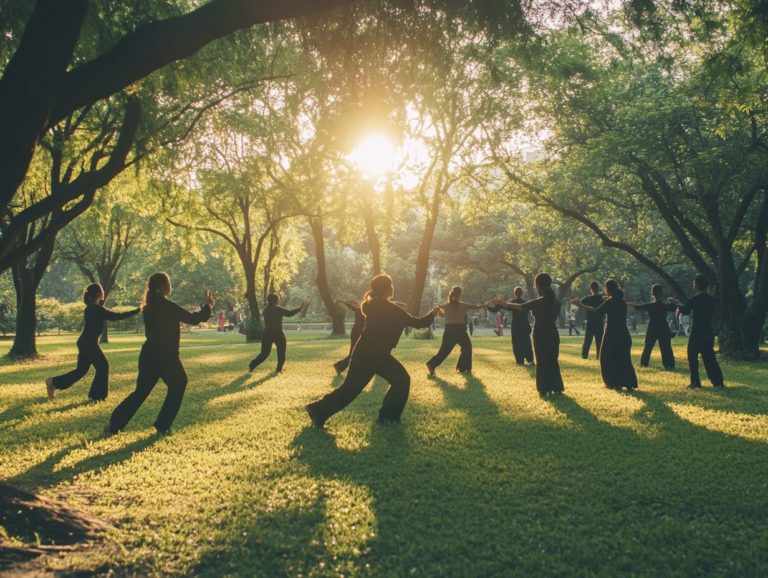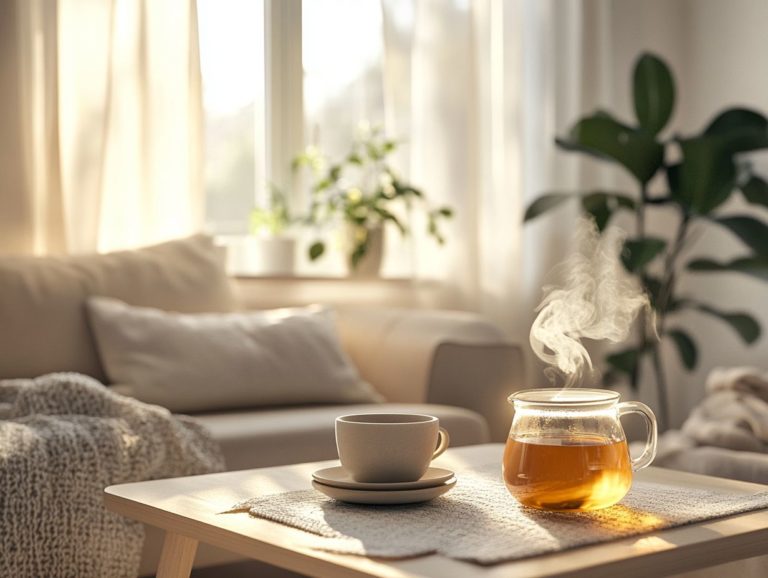5 Simple Meditation Techniques for Anxiety
In today’s fast-paced world, you might find anxiety creeping in more often than you’d like. Are you ready to find your calm? Let s dive into five easy meditation techniques that can change your life! Fortunately, meditation stands as a powerful ally, offering you a pathway to calm amid the chaos.
This article delves into five straightforward meditation techniques Deep Breathing, Body Scan, Guided Visualization, Mantra, and Mindful Walking that can effectively help ease your anxiety.
You’ll also uncover how to seamlessly integrate these practices into your daily routine, explore the myriad benefits of regular meditation, and dispel common misconceptions that may be holding you back.
Join us to discover the meditation technique that resonates with you and gather insights on maintaining a consistent practice for lasting peace.
Contents
- Key Takeaways:
- 1. Deep Breathing Meditation
- 2. Body Scan Meditation
- 3. Guided Visualization Meditation
- 4. Mantra Meditation
- 5. Mindful Walking Meditation
- How Does Meditation Help with Anxiety?
- What Are the Benefits of Regular Meditation Practice?
- How Can Meditation Be Incorporated into Daily Life?
- Have You Ever Wondered What Misconceptions Exist About Meditation for Anxiety?
- How Can One Find the Right Meditation Technique for Them?
- What Are Some Tips for Maintaining a Consistent Meditation Practice?
- Frequently Asked Questions
- What are the benefits of 5 simple meditation techniques for anxiety?
- How do I know which meditation technique is best for my anxiety?
- Can I practice these techniques anywhere?
- How often should I practice these meditation techniques?
- Can these techniques be combined with other forms of treatment for anxiety?
- Are there any potential risks or side effects of practicing these techniques?
Key Takeaways:
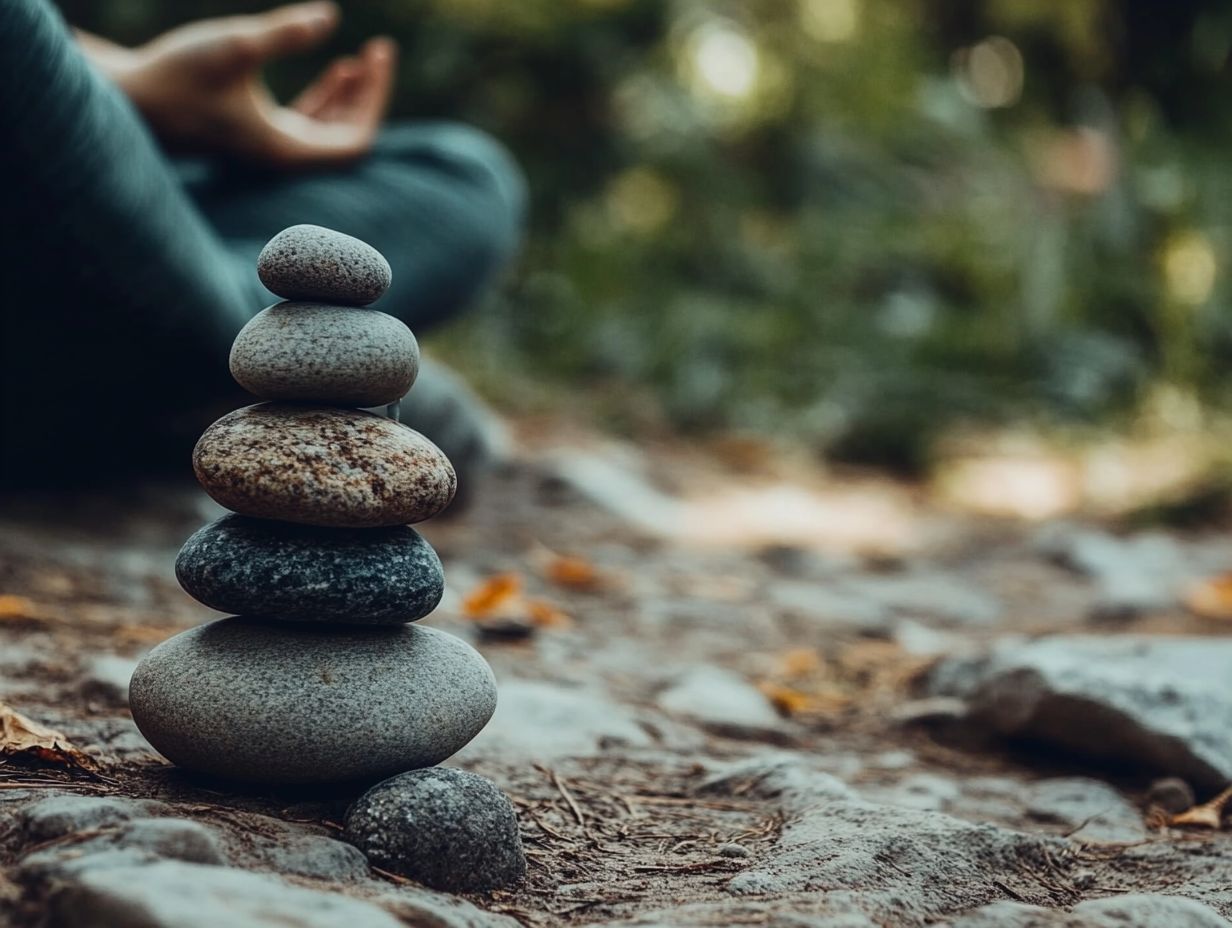
- Deep breathing, body scan, guided visualization, mantra, and mindful walking are simple yet effective meditation techniques for managing anxiety.
- Practicing meditation regularly can lower stress, boost self-awareness, and promote relaxation.
- Incorporating meditation into daily life can be as simple as setting aside a few minutes each day, finding a quiet space, and using a meditation app or guide.
1. Deep Breathing Meditation
Deep breathing meditation is a transformative mindfulness practice that centers around conscious breathing. It allows you to cultivate relaxation, reduce stress, and enhance your overall well-being. It s an excellent technique if you re looking to boost your mental health and improve emotional regulation.
By incorporating breathing exercises, you can tap into your body s inherent ability to foster calmness. These are breathing exercises that help you feel calm. This approach encourages you to take deep breaths through your nose, allowing your belly to rise as your diaphragm contracts and expands. Then, you slowly exhale, which helps to release any built-up tension.
Mindful inhalation and exhalation not only support your physical relaxation but also enhance your resilience against emotional challenges, giving you the ability to manage anxiety more effectively. Engaging in this practice regularly can lead to a significant decrease in stress levels, enhancing your emotional well-being and promoting a more balanced state of mind.
2. Body Scan Meditation
Body scan meditation is a powerful mindfulness technique that invites you to develop awareness of your thoughts and feelings and relaxation. By directing your attention to various parts of your body, you cultivate a deeper understanding of both physical sensations and emotional states.
To begin this practice, find a comfortable position whether you prefer sitting or lying down and close your eyes to minimize distractions. Starting from your toes, direct your attention. Notice any tension or discomfort, and consciously relax each area as you move upward. Gradually shift your focus to your feet, legs, torso, arms, neck, and finally, your head, systematically attending to every part of your body.
This method also helps you connect deeply with your body, giving you the ability to better regulate your emotions and manage stress. Ultimately, it allows you to reconnect with your body, fostering enhanced emotional resilience and guiding you toward a peaceful state of mind.
3. Guided Visualization Meditation
Guided visualization meditation is a powerful technique that harnesses imagery and positive affirmations to help you achieve mental clarity, emotional resilience, and a profound sense of inner peace. It serves as an effective tool for enhancing your mental health and overall well-being.
You can imagine calm places, like a serene beach under a clear blue sky or a peaceful forest filled with the soothing sound of rustling leaves. These scenarios allow your mind to escape the daily stressors, facilitating deep relaxation. Many who participate in these visualizations report feeling uplifted and experiencing a decrease in anxiety levels.
By incorporating visualization into your routine, you can actively reshape your mental landscape, finding comfort and a renewed sense of control in your emotional states.
4. Mantra Meditation
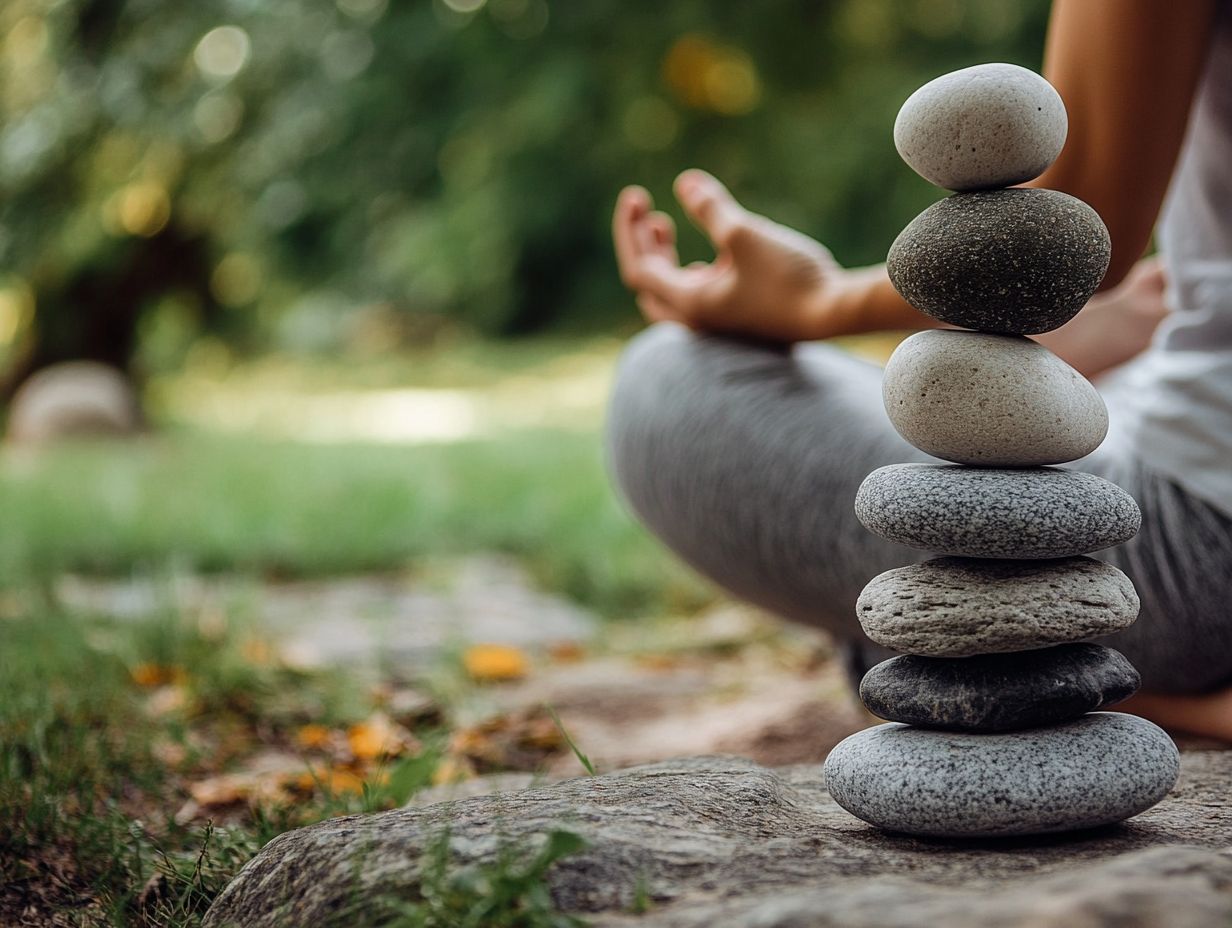
Mantra meditation is a focused technique that invites you to repeat a specific word or phrase. This practice enhances your concentration and promotes relaxation, facilitating an elevated state of consciousness. It’s perfect for anyone seeking mental clarity and emotional stability.
This form of meditation has roots stretching back thousands of years and is often linked with ancient spiritual traditions like Hinduism and Buddhism. The aim goes beyond just quieting the mind; it s about awakening inner awareness and fostering a deeper connection to your true self.
Select a mantra that resonates with you. It could be a traditional bija mantra which is a short sound or word that holds special meaning or a simple affirmation. The right mantra can truly make a difference. With consistent practice, you might notice improvements in emotional regulation and reduced stress levels, leading to enhanced mental focus and a profound sense of overall well-being.
5. Mindful Walking Meditation
Mindful walking meditation invites you to focus on the sensations of movement and the present moment. This practice enhances your self-awareness while promoting a sense of calm and connection with your surroundings.
You can easily incorporate this practice into your daily life with just a few steps. Start by finding a peaceful environment where you can walk undisturbed. This allows you to cultivate a deeper bond with nature.
As you walk, pay attention to each footstep, the rhythm of your breath, and the sensations throughout your body. Appreciate the ground beneath you and the air around you. This state of awareness can dramatically reduce stress and bolster your emotional resilience.
You might soon find that this focused movement anchors you in the present and offers a refreshing escape from daily chaos. It can transform into a powerful tool for your mental wellness.
How Does Meditation Help with Anxiety?
Meditation can be a powerful ally in alleviating anxiety. It promotes emotional regulation, enhances self-awareness, and cultivates a profound sense of calm. Additionally, incorporating aromatherapy for anxiety can also be highly beneficial. Mental health professionals highly recommend these practices for anyone dealing with anxiety disorders.
This practice activates your body s relaxation response, providing a soothing counterbalance to the stress response that often occurs during anxiety episodes. Experts like Elizabeth Scott, PhD, emphasize that meditation can significantly lower cortisol levels the stress hormone allowing you to experience reduced tension and increased mental clarity.
Research from Harvard Medical School supports this, revealing that regular meditation enhances cognitive functions like focus and memory, which are often clouded by anxiety. By breaking the cycle of negative thinking and fostering mindfulness, you become more equipped to handle stressors. This creates a ripple effect, improving your emotional resilience and stability.
What Are the Benefits of Regular Meditation Practice?
Engaging in regular meditation offers a wealth of benefits, including improved emotional well-being, enhanced mental clarity, and effective stress reduction. These benefits make meditation essential for overall health and resilience in today s demanding world.
Studies reveal that individuals who meditate can experience a remarkable 30% reduction in stress levels and a significant boost in focus and productivity. A report from Tiny Buddha features personal testimonials from practitioners, illustrating that consistent meditation nurtures a deeper sense of inner peace and promotes emotional regulation. This enables individuals to tackle challenges with greater composure.
In fact, 75% of those interviewed reported noticeable improvements in their relationships and overall life satisfaction. This highlights meditation’s transformative power across personal and professional spheres.
Ready to try mantra meditation? Start today and feel the difference!
How Can Meditation Be Incorporated into Daily Life?

Incorporating meditation into your daily life can be effortlessly achieved through simple mindfulness practices and meditation techniques. This allows you to elevate your daily care routine while cultivating a deeper sense of peace and awareness throughout your day.
Finding moments of stillness, even amidst the chaos, can be as easy as practicing short breathing exercises while waiting in line or taking a mindful pause during lunch breaks. Each small adjustment contributes to building a habit; for instance, committing to a consistent five-minute morning session can set a serene tone for your day.
It’s essential to explore various techniques like guided meditations or body scans, a technique where you focus on different parts of your body to release tension to discover what resonates most. Ultimately, consistency is your secret weapon, transforming fleeting moments into lasting habits that can profoundly enhance your overall well-being.
Have You Ever Wondered What Misconceptions Exist About Meditation for Anxiety?
Many people hold misconceptions about meditation for anxiety, wrongly believing that it’s all about emptying the mind or demanding extensive time commitments. These misunderstandings can hinder you from truly experiencing the benefits of meditation in managing anxiety disorders.
In reality, meditation is much more accessible and flexible than these myths imply. You can tailor it to fit your individual needs, making it easy for even beginners to find an approach that suits them without feeling overwhelmed.
Techniques like guided meditation, mindfulness practices, and breathing exercises can seamlessly integrate into your daily routine, and for those looking for more targeted methods, consider these tips for anxiety training success, which often require just a few minutes to yield positive results.
Meditation isn t a one-size-fits-all solution; it encourages you to experiment with different styles to discover what resonates best. This adaptability gives you the power to cultivate a practice that feels right and truly beneficial for your journey with anxiety.
How Can One Find the Right Meditation Technique for Them?
Finding the right meditation technique that aligns with your individual needs and preferences can significantly elevate your practice, enhancing your emotional resilience and overall mental well-being.
With a diverse array of styles at your disposal, from mindfulness meditation that fosters present-moment awareness to loving-kindness meditation that nurtures compassion for yourself and others, you have the freedom to choose approaches that resonate deeply with your unique experiences. Guided meditation can also offer a structured pathway, making it simpler for both beginners and seasoned practitioners to focus and unwind.
Investing time in your meditation journey is vital and can be incredibly rewarding! It’s crucial to experiment with different practices and tailor them to fit your lifestyle. This way, your meditation journey becomes not just authentic but also sustainable.
What Are Some Tips for Maintaining a Consistent Meditation Practice?
Maintaining a consistent meditation practice is essential for you to fully reap its benefits, and there are several practical tips that can help you establish and sustain your daily care routine while enhancing your mindfulness exercises.
To start, setting realistic goals will make the process more achievable and far less daunting. Instead of diving straight into long sessions, consider beginning with just five minutes a day and gradually increasing the duration as you grow more comfortable.
Creating a dedicated space for meditation is another highly effective strategy. A quiet corner with minimal distractions can significantly enhance your focus and make the entire experience more inviting.
Mindfulness apps provide guidance, reminders, and community support tools that are invaluable for keeping you motivated.
Most importantly, navigating this journey requires patience and self-compassion. Acknowledge that every step you take is part of your unique path toward mindfulness.
Frequently Asked Questions
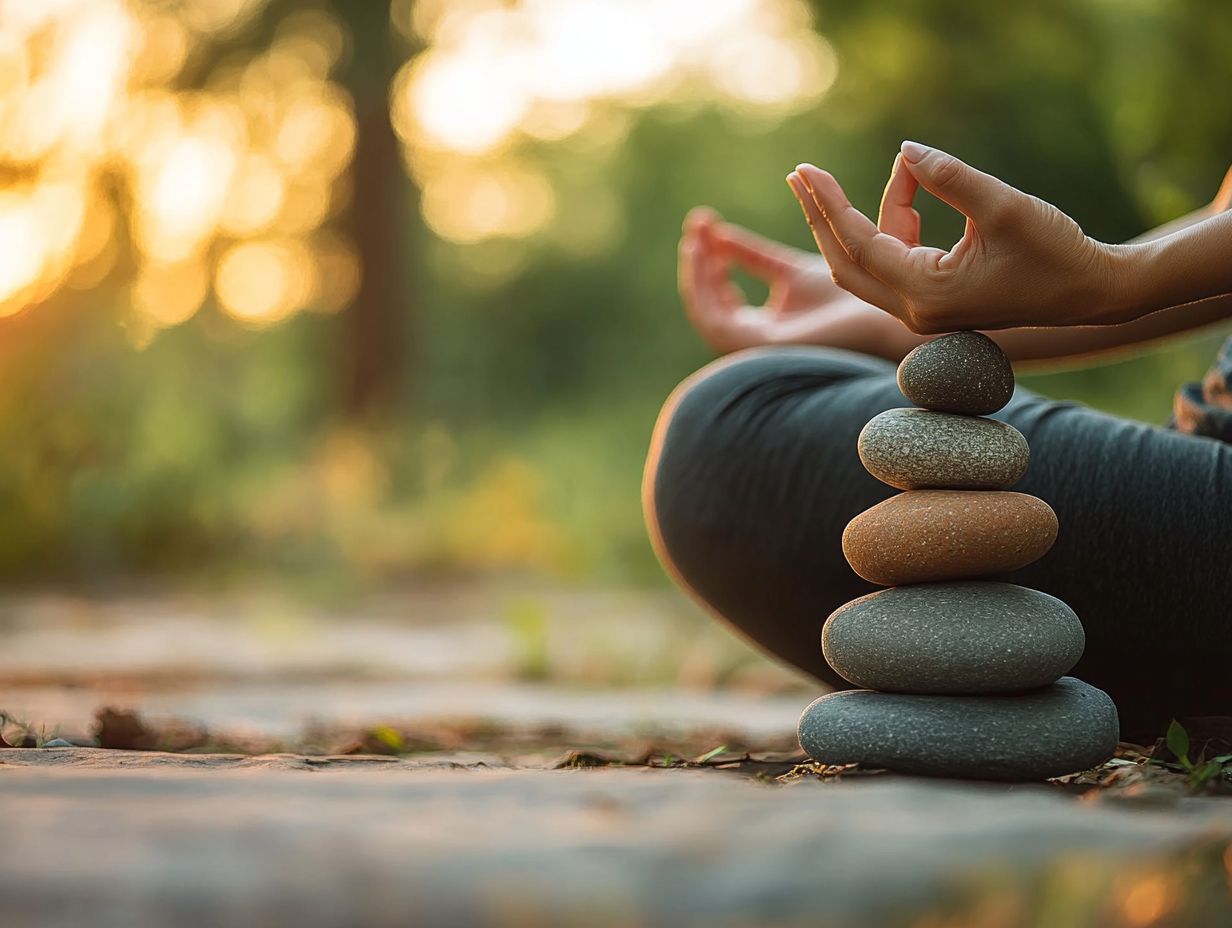
What are the benefits of 5 simple meditation techniques for anxiety?
These five techniques can significantly reduce stress and anxiety.
They also boost focus, self-awareness, and emotional control, leading to better overall well-being.
How do I know which meditation technique is best for my anxiety?
Try out different techniques to find the one that suits you best.
Popular options include focusing on your breath, body scan meditation, guided imagery, loving-kindness meditation, and mantra meditation.
Can I practice these techniques anywhere?
Absolutely! These techniques can be practiced anywhere at home, work, or even in public spaces.
All you need is a quiet, comfortable spot to sit and concentrate on your breath or another focal point.
How often should I practice these meditation techniques?
It’s recommended to practice for at least 5-10 minutes daily.
You can extend your practice if you have more time. Remember, every minute counts when it comes to reducing anxiety!
Can these techniques be combined with other forms of treatment for anxiety?
Yes, these techniques can be a great complement to therapy, medication, or other treatments.
Always consult a healthcare professional before adding new techniques to your treatment plan.
Are there any potential risks or side effects of practicing these techniques?
Meditation is generally safe for most people.
If you have underlying health conditions or are pregnant, consult a healthcare professional before starting. Some may experience temporary discomfort or emotional release, but these feelings usually fade with practice.

